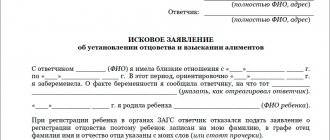Is it possible to file for alimony for a pregnant wife? Pregnancy is the most long-awaited and anxious period in the life of a family. This event is accompanied not only by nervous tension and changes in mood or tastes of the expectant mother, but also by large financial expenses. It’s good when the husband cooperates and helps in every possible way during this period. But there are other husbands who do not want to support the future mother of their baby for various reasons, for example, they do not recognize the child as their own or simply do not consider it necessary to support the mother of the future offspring. What should a future mother do? A wife in a position has much more rights than she is accustomed to think. And in this article we will tell you how to arrange alimony for your pregnant wife.
Alimony for a pregnant or maternity spouse
No matter how paradoxical it may sound, alimony is not only the lot of divorced people.
The need to collect them may arise even while you are married. The legislator provides for the obligation of spouses to financially support each other. This norm is prescribed in Article 89 of the RF IC. It is assumed that the husband and wife will independently agree on the amount of maintenance, but there is also provision for “distribution of the family budget” in court. In the vast majority of cases, women enjoy this right. Such a need may arise when the wife cannot work and the husband refuses to provide her with funds. Then the court will oblige the husband to pay alimony for the maintenance of his wife. Family law experts remind you that in order to collect alimony payments there must be compelling reasons and they are clearly stated in the Family Code.
They can count on:
- Spouses who are in an officially registered marriage;
- A spouse who is recognized as disabled and in need;
- A pregnant wife, or a mother who is raising a child under 3 years of age;
- One of the spouses who is entrusted with raising a disabled child until he reaches 18 years of age, or a group I disabled child on a permanent basis (such a parent is recognized as needy for life).
As for pregnancy, in this case a woman does not need to prove anything at all to receive alimony for her maintenance from her spouse. A certificate from the clinic confirming this fact is sufficient. This rule applies regardless of whether the marriage is valid or dissolved at the time of application.
A similar rule applies to a mother raising a child until he is 3 years old. While on maternity leave, a woman is physically unable to work and support herself, so this responsibility falls on her husband. It doesn’t matter whether the child was born in marriage or after the parents separated.
The main thing is that this happens no later than 300 days after the official divorce of the spouses. If a man doubts that the child is his, he can establish paternity in court. If the examination confirms doubts and infidelity of the other half, alimony for the wife will not have to be paid.
In order to find out what rules apply to spouses between whom alimony relations have arisen, you need to open the fourteenth chapter of the Family Code. First of all, we advise you to pay attention to Article 89, the first paragraph of which states that the husband is obliged to provide financial support to his wife, and the wife, in turn, to the husband.
If these actions are not carried out at the own request of one of the spouses, then the second has the right to withhold alimony payments from his profit. Exactly the same privileges apply to pregnant wives, even those who are currently divorced.
Some women expecting a child, who were unable to conclude a notarized alimony agreement with their husband, when applying to the courts with this request are refused. In most cases, this happens because applicants for accrual of cash payments did not take into account the following details:
- The spouse must have a low income. A wife demanding alimony compensation from her husband must necessarily be in financial need. Moreover, this fact must not only be indicated in the statement of claim, but also confirmed by attaching a certificate of income 2-NDFL.
- The spouse must prove her pregnancy. The right to alimony is granted to an individual based on a certain circumstance approved by the Family Code. Since in this case the role of such a fact is pregnancy, a corresponding certificate from the hospital is required. However, such a document is not issued in the early stages. In this regard, the calculation of alimony benefits will need to wait.
- The spouse does not have to draw up a pre-alimony agreement. In the history of judicial practice, there have been situations when a pregnant wife entered into an alimony agreement with her husband at a notary, and then additionally filed a claim with the judicial authorities containing a demand for re-collection of alimony benefits. If an agreement has already been drawn up, then it will not be possible to achieve the accrual of material payments again.
We suggest you read: Withhold alimony before or after withholding personal income tax
When can you collect alimony from your husband?
You can also receive alimony for your pregnant spouse after a divorce. The main thing in such a situation is that the wife has evidence of her difficult financial situation. If a spouse can receive alimony as a disabled woman, she needs to prepare documents that can prove that she received such status during the marriage or within 12 months after its dissolution.
A wife can receive alimony from her husband within the following periods:
- caring for a child until he reaches the age of 3 years;
- to care for a child until he reaches adulthood;
- to care for a child of the 1st disability group on an indefinite basis.
The process of paying alimony will stop when these periods end.
The spouse is obliged to pay simultaneously alimony for his wife (and ex) and separately for the child.
Payments for the pregnant spouse will begin to be collected from the moment she filed the corresponding claim in court. Also, alimony may begin to be collected from the moment the parents draw up the alimony agreement.
Legislative norms
The need to pay alimony to a pregnant wife is laid down in paragraph 90 of the Family Code. The amount is regulated by the following article - 91. It obliges the court to award alimony to a woman during pregnancy in a fixed amount. The law requires compliance with such requirements by the court. But there is another possibility.
Attention: the maintenance of a pregnant woman can be established:
- voluntary agreement;
- court decision.
In addition, the situation is influenced by the regime of property relations existing between spouses. There are two of them:
- legal - installed automatically after registering a bond;
- negotiated - after signing the marriage contract.
In the latter case, the text of the document must define specific conditions for the distribution of funds. Including:
- under what conditions does a man pay his partner alimony during maternity leave;
- their size;
- procedure for transferring money and the like.
Regulatory framework for paying alimony to a pregnant woman
The main law on the basis of which alimony is collected by a pregnant wife is the Family Code, namely Article 89 of the RF IC. In accordance with the article, husband and wife must jointly decide on the maintenance of each other. If they were unable to reach an agreement on their own, alimony during the spouse’s pregnancy can be recovered through the court. Then, in addition to the RF IC, the provisions of the following regulations will apply:
- Code of Civil Procedure of the Russian Federation (Section VII), on the basis of which a statement of claim is drawn up, a trial is conducted and a writ of execution is issued.
- Federal Law No. 229, according to which payments to a pregnant wife are withheld from the spouse’s income.
- RF IC (Article 102, 103), when collecting funds in case of failure to comply with the provisions of the relevant agreement certified by a notary.
If desired, the husband and wife can resolve the issue of alimony even before the spouse becomes pregnant. This is done as part of the marriage contract. But if the contract is contrary to law, it will be invalid: in practice, in most cases, it is useless.
Legal regime of property relations
In the case where the couple did not draw up a marriage contract, the issue can be resolved in two ways:
- voluntary;
- forced.
At the same time, the legislation allows for the division of property (in our case, obliging the man to pay maintenance to the pregnant woman):
- during the duration of the bond;
- during a divorce.
Hint: in practice, it is better to reach an agreement than to file a claim in court.
Legislation provides partners with a priority opportunity to resolve internal problems without resorting to judicial authorities. That is, people can independently agree:
- how much should a pregnant woman be paid?
- with what frequency to transfer funds;
- when the period for making alimony payments ends, etc.
Such conditions are formalized in writing - an agreement. Signed by both parties. It is advisable to indicate all conditions in as much detail as possible:
- payment amount;
- frequency: one-time;
- monthly or other;
Advice: it is recommended to immediately include alimony in the contract for a woman raising a child until her 3rd birthday. The father is also required to pay these.
The law does not require notarization of the agreement. However, in practice, a lawyer’s signature helps to get rid of many problems. The most basic one is a man’s refusal to support a pregnant woman.
Help: changing the terms of agreements is allowed:
- drawing up an addition to it that satisfies both;
- judicially.
In addition, a signed obligation to pay amounts is the basis for their collection of alimony. To do this, a special application is submitted to the bailiff service. A copy of the agreement is attached.
Unfortunately, it is not always possible to achieve the voluntary consent of a man to support a pregnant woman. In this case, there is only one thing left to do - to file for alimony in court. To do this, a woman needs:
- file a claim;
- collect evidence.
The legislation answers the question whether a husband should pay alimony to his current or ex-wife if she is on maternity leave, and the answer is unequivocal. Therefore, the claim must be substantiated by Articles 90 and 91 of the Criminal Code. But this is not enough. The same paragraphs indicate that the amount of payment depends on the financial status of both.
This means that the need for additional funding must be proven. To do this, it is recommended to collect:
- certificates of income, if they are small;
- checks: for medicines prescribed by a doctor at the antenatal clinic;
- to pay for other pregnancy-related procedures;
- treatment;
The court will definitely take the above documents into account when determining the amount of payments. It must be remembered that the spouse will protect his interests. For example, it will reduce income levels. Therefore, it is necessary to obtain documents about his earnings in advance and attach them to the claim.
The main document confirming the claim is the calculation of alimony amounts. It is drawn up by the applicant based on immediate needs, namely the amount of costs:
- for food;
- medications and procedures;
- housing maintenance.
Attention: you should not include the cost of purchasing luxury goods in your calculations. The judge will not take them into account.
How to resolve an issue without court involvement
Going to court is a last resort. A woman takes this step after all attempts to talk with her husband and come to a common opinion regarding the financial support of her pregnant wife have not been successful.
If the spouses do manage to come to an agreement, then they must document . Namely:
- Put the oral agreement in writing. The contract sheet is provided in 3 copies.
- Both spouses must appear at the notary's office.
- Both husband and wife sign the contract sheet and give it to the notary for review.
- Pay the state fee.
From the moment of certification, a correctly drawn up and executed contractual agreement acquires the force of a writ of execution, equivalent to a court ruling on the collection of alimony payments.
Ex-wife's right to receive alimony after divorce
The court may oblige a man to financially support his ex-wife, regardless of whether they have children together and how old they are. In this case, two more points are added to the above listed content points:
We suggest you read: How is the apartment divided if I was born before privatization and my sister was born after?
- The wife was recognized as incapacitated and in need during the marriage, or for a year after its dissolution
- The wife retired due to age and was recognized as needy for a period of five years after the divorce. This factor plays a role if the spouses have been married for a long time
The legislator does not indicate what long or short time means. Accordingly, the judge will have to decide this based on the specific case.
At the same time, it is clearly stated in which cases the former or current spouse cannot count on their maintenance. This occurs if the disability is the result of alcohol or drug abuse, or the commission of a crime. If the wife neglected her responsibilities towards her husband and children. Or in the case when the marriage was short-lived. Again, no specific date has been specified.
Lawyers note that husbands often use the unconscionability clause in a marriage to avoid paying money. Therefore, cases of alimony for the maintenance of an ex-wife must be carefully verified, a circle of witnesses must be selected and all necessary documents must be collected.
In addition to the key points that initially do not give the wife the right to demand alimony for her maintenance, there is a list of rules under which payments to the spouse are terminated:
- The woman returned to work from maternity leave;
- The child has reached the age of 3 years;
- The wife's health improved and her disability was removed;
- The woman entered into a new marriage;
- The death of one of the parties.
A man cannot voluntarily stop paying alimony to his ex-wife for her maintenance simply because he knows about a change in her life situation. If the court ordered payments before a certain period, the obligations are considered fulfilled upon the expiration of the period. But in a situation where alimony obligations are indefinite, the man must file a lawsuit and prove that his ex-wife no longer needs his support.
What factors will influence the court's decision?
The judge must listen to both sides. In addition, he must take into account the interests of other dependents of the defendant. The following factors influence his decision:
- the amount of income of the plaintiff and defendant;
- the health status of both (the ability to earn money);
- the presence of the defendant in his custody: minors;
- disabled.
When making a decision, the judge must determine whether a certain amount can be recovered from the defendant without jeopardizing the financial situation of others. The court bases its opinion:
- on the amount of the defendant’s (official) earnings;
- based on data on black wages (if proven).
As long as the partners are in an official relationship, the woman’s husband is automatically recognized as the father of the newborn. In addition, if pregnancy is confirmed, they can submit an application to the registry office for recognition of paternity. If a man does not want to recognize himself as a future dad, then an examination is carried out.
Advice: the claim must include a clause on compensation for the costs of conducting a paternity test.
The legislation defines the conditions under which a pregnant woman cannot claim maintenance from her ex-spouse. They are:
- Short lifespan of bonds. This is not specified specifically; the court determines it independently.
- A woman's behavior is unworthy. This refers to betrayal, immoral behavior, alcohol or drug abuse.
- Disability caused by the fault of a pregnant woman. For example, if a woman gets sick as a result of drug addiction or committing a criminal act.
Tip: You should always take into account that a man will be able to attract witnesses and specialists to prove a condition that relieves him of responsibility for his pregnant wife.
Alimony obligations to a disabled wife
A disabled wife has the right to claim financial support from her current or former spouse. In this case, the combination of two factors is important - the woman must be recognized as disabled and in need. Both must be proven in court. Disabled people for health reasons, as a rule, are recognized as disabled people of groups I-II who cannot perform this or that work.
We suggest you read: How to apply for child support if the child is not registered with the father
Accordingly, it is the symbiosis of two factors that is important – both disability and need. For example, a person is disabled and at the same time owns a business or receives dividends from shares - he cannot be recognized as needy. Or, a completely healthy woman who is not of retirement age cannot claim alimony simply because she needs it, but does not want to work - the court will recognize her as able-bodied and refuse payments.
Is it possible to cancel alimony for a pregnant spouse?
If a wife is caring for a disabled child of the 1st group, then the husband is obliged to pay alimony for her for life.
According to paragraph 2 of Article 120 of the Family Code of the Russian Federation, in order to cancel alimony for a wife, it is necessary to prove that there is no reason for such material support:
- the wife has an official salary and is not on maternity leave;
- ex-wife got married;
- spouse died;
- the spouse was relieved of her disabled status.
If the wife agrees with the termination of alimony payments for her, then it is enough to draw up an additional alimony agreement. Otherwise, the husband will have to file a lawsuit.
The spouse has the right to file a lawsuit to recalculate the amount of alimony if the wife’s financial situation has improved.
About the amount of alimony
The law establishes a rule according to which maintenance to a woman is assigned in a fixed amount. The court is focused on meeting the vital needs of the pregnant woman and her unborn baby.
If the defendant does not have official income, then the cost of living is taken into account. Unfortunately, in such a situation the amount of deductions will be small. You can increase it if you prove that a man has:
- unofficial income;
- valuable property.
For information: theoretically, part of the alimony payments can be assigned in kind:
- products;
- things and other property.
Civil marriage
If the relationship is not formalized, then the rights of the pregnant woman are not protected. Such a couple is not subject to family law; therefore, the woman has no right to demand money. Although it is possible for a man to support a pregnant woman, this requires his voluntary consent.
Note: a woman will be able to demand alimony through the court only after giving birth.
Let's look at an illustrative example. A woman approached a lawyer with the question: “Can I get alimony from my common-law husband during my pregnancy? I have no income. He refuses to give money."
Clarification: in order to receive funds for maintenance, you must:
- the man's consent;
- presence of official marriage;
- recognition of paternity.
The common-law wife has no grounds for claiming alimony. But she can try to persuade the man to submit an application to the registry office for recognition of paternity during pregnancy. The court will take the official document into account when considering the claim. But there is no complete certainty that payments will be assigned.










